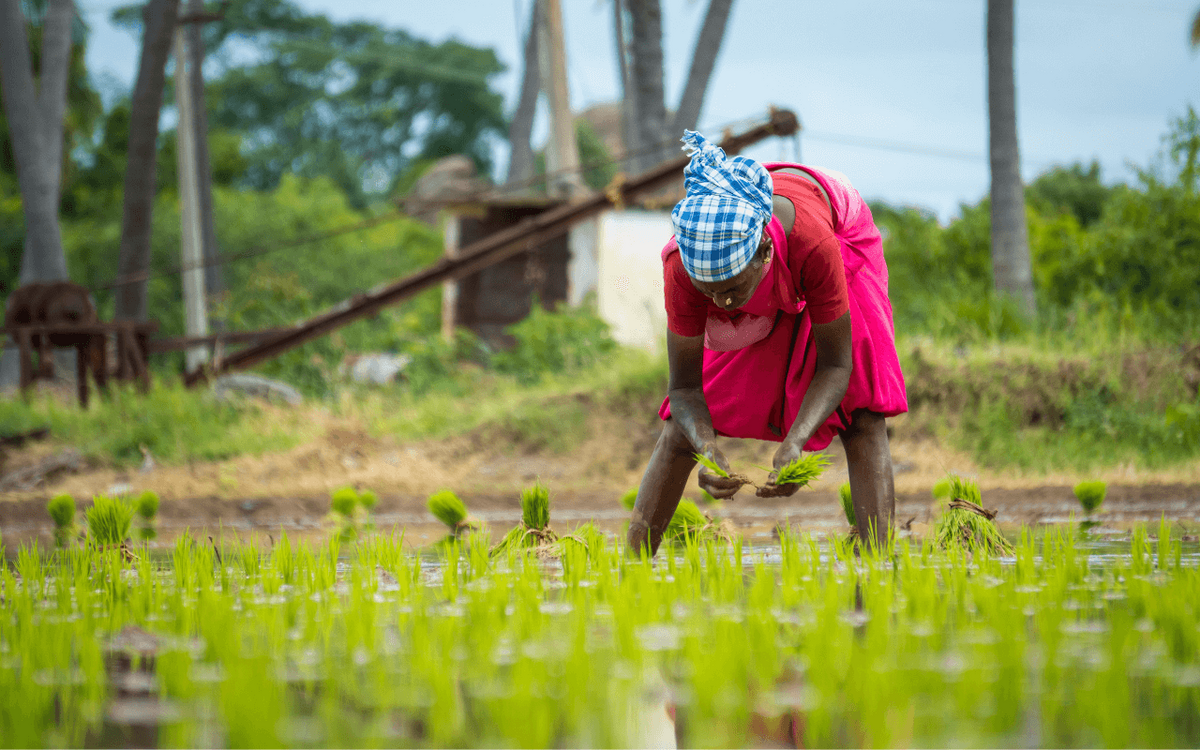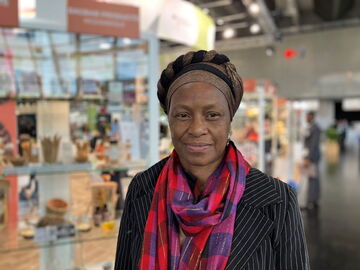Newsletter
Don't miss a thing!
We regularly provide you with the most important news, articles, topics, projects and ideas for One World – No Hunger.
Newsletter
Don't miss a thing!
We regularly provide you with the most important news, articles, topics, projects and ideas for One World – No Hunger.
Please also refer to our data protection declaration.
Claudia Jordan
Three female entrepreneurs from Mozambique, Sri Lanka and Uganda tell their stories about starting organic businesses from scratch, now selling Baobab Oil, Gotukola powder and Shea butter in international markets. And they explain why their business is almost 100 percent female.


Milagre Nuvinga could see the change not only in the faces, but also in the villages. The structural poor Manica province in central Mozambique is a very dry region. „Everything was brown, poor and depressed“, the organic entrepreneur tells. „There was nowhere to go and nothing to dream.” This was before Milagre Nuvunga, herself a forest engineer, started a Baobab business with 500 female harvesters, bringing the women into jobs and including them in business development.
From then on, something has visibly changed. “Now, when you visit the houses in the villages, they look beautiful and clean, and people look beautiful and colourful, too”, she says. People had very little self-esteem, didn’t invest much in themselves. “Now, the women do their hair and their kids look beautiful, too.” Also, the men reacted. “Some of them were drinkers, but when they saw their wives changing, they themselves decided to change, because they felt proud of their women.”
Why all this has changed? Because the women have started to take their future into their own hands. In a society with polygamous marriages and women leaving school before they learn to read and write, and in an area with a depressed economy and little perspectives, many of the women have no chance to build on their own path with a business or job for their own income. When Milagre Nuvunga started the inclusive business “Baobab products Mozambique” with around 500 women, the Baobab trees in the region weren’t valued. Traders from Malawi and Mozambique bought it for very cheap prices. “Men in the patriarchal communities are charged with earning the money. They would not waste their time with Baobab trade. So, they left it to the women”, she says and smiles.
In order to be able to produce high quality Baobab oil and powder products, Nuvunga started to look at all aspects of the collection of the fruits and pre-processing, worked on hygiene, how to prevent mould. In order to check the opportunities for regional and international trade of their Baobab products, she also talked to certifiers to see how they could organise this business with women.
When they participated at the Biofach trade fair, supported by Deutsche Gesellschaft für Internationale Zusammenarbeit (GIZ) and Import Promotion Desk (IPD), they received the organic certificate for their Baobab products. They started getting buyers from Europe and the business grew. Today, the business includes 3.500 female harvesters, registered exports of powder have increased from zero to more than 150 tons per year.
“For many of the women being able to write their names and sign papers in the context of business was a huge step.”
“As the business grew, women needed to grow with it”, Nuvunga says. With the Micaia foundation that she is leading, she works on social and environmental issues that are connected to the business. In small learning groups, she supports the women in enhancing their basic skills. “Many of them come out of school very early and have early marriages. For many of them being able to write their names and sign papers in the context of business was a huge step. So, we started organising that.” GIZ supported the women in the association development, saving and credit skills. “They were able not only to dream but to discuss what business opportunities they had,” Nuvunga states.
With the money they earn through the Baobab products, the women build their own businesses. They travel to nearby towns or beyond, see what markets exist outside to bring products to their communities. With the capital from the Baobab trade, they buy and sell household goods, clothing, open their own bars. They also are able to keep their children in school and buy books for them. “All this opened a space for them to start to invest in their own lifes”, Nuvunga concludes.

Lakmini Weerakkody saw 30 percent of fruits and vegetables go to waste in the post-harvest process in Sri Lanka. This led the industrial manager to invent a machine to dehydrate fruits and vegetables and built her own factory manufacturing these products, together with the Gotu Kola plant. “During the pandemic, the demand for healthy food raised and I invested more in the Gotu Kola plant. I manufacture the Gotu Kola powder for herbal drinks, skin care and salat dressing”, she says. After having started the business in 2019, she built a new factory in 2021, called Lak Nature International.
“My factory is 100 percent female”
... she says with a proud smile. She has 15 female employees and works with around 30 female farmers that supply her the products. “Many of the women in the region are housewifes and have no income. I took them to my factory and provided flexible time to work there.” After testing their land and soil if they can produce organically, she invited female farmer groups to produce Gotukola plants and supply the factory with them. “I also train them in producing organically. We produce 20 tons per year. They now have extra income for their families.”
Today, she is indirectly exporting to more than 10 countries. With already several international certifications, she is currently applying for organic certification. GIZ project “Strengthening Small and Medium-sized Enterprises in Sri Lanka” supports her in her business development and creating her own brand.

For Margaret Laloyo, the civil war in her country made her feel the need for change. During the conflict in Northern Uganda (1987-2006), large parts of the population were internally displaced and lived in refugee camps for more than 20 years. “That drowned them into a dependency mindset”, the biochemist states. She addressed the women in the refugee camps and said: “Stop saying ‘we need’ and start to see what you actually have available.”
And there were these Shea trees, the highest popluation in the Agago district in Northern Uganda. They were at risk of being extict and the women started campaigning for the conservation of the trees. With 25 women, Laloyo started processing the Shea. She worked with the families and included the youth.
“Organic is a blessed method, because it protects the health of the soil, the insects, animals and the people.”
... says Margaret Laloyo. They were aware that with this step, they broke cultural norms. “The tribes there didn’t believe in women owning anything”, Laloyo explains. And in fact, the land they were working on is owned by men until today. But they continued. And the movement with 25 women grew to an organisation titled “Blessed Organic Release”, including 6.000 female harvesters. Every woman got a bank account. “Initially, they feared it, because they were illiterate. But they succeeded and now they have safe money for school fees.”
When the war stopped in 2006, they started working on the quality management. With training at the American Shea Butter Institute, they reached Grade A, the maximum quality. They were able to get a bigger buyer in Canada who took 500 kilogramms of Shea butter – a great motivation for the women. In 2015, they got the EU organic certification and came to Biofach fair as exhibitors in the African pavillion.
Even in 2023, “Blessed Organic Release” presented its Shea butter for skin, Shea oil and Shea honey there. And the word “blessed” in the name has its implications: “As a Christian, I am convinced: Organic is a blessed method, because it protects the health of the soil, the insects, animals and the people. It’s not just a question of believe – ‘blessed’ is a positive statement, even if you don’t believe. Our organisation is not faith-based or political. We accept people of all faiths. We work with poor people. Poverty is poverty.”